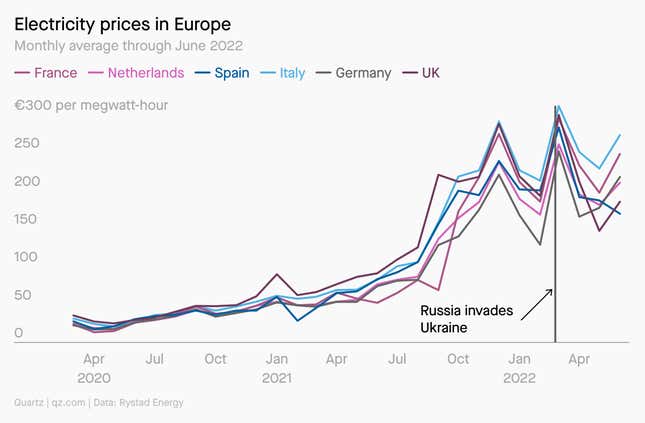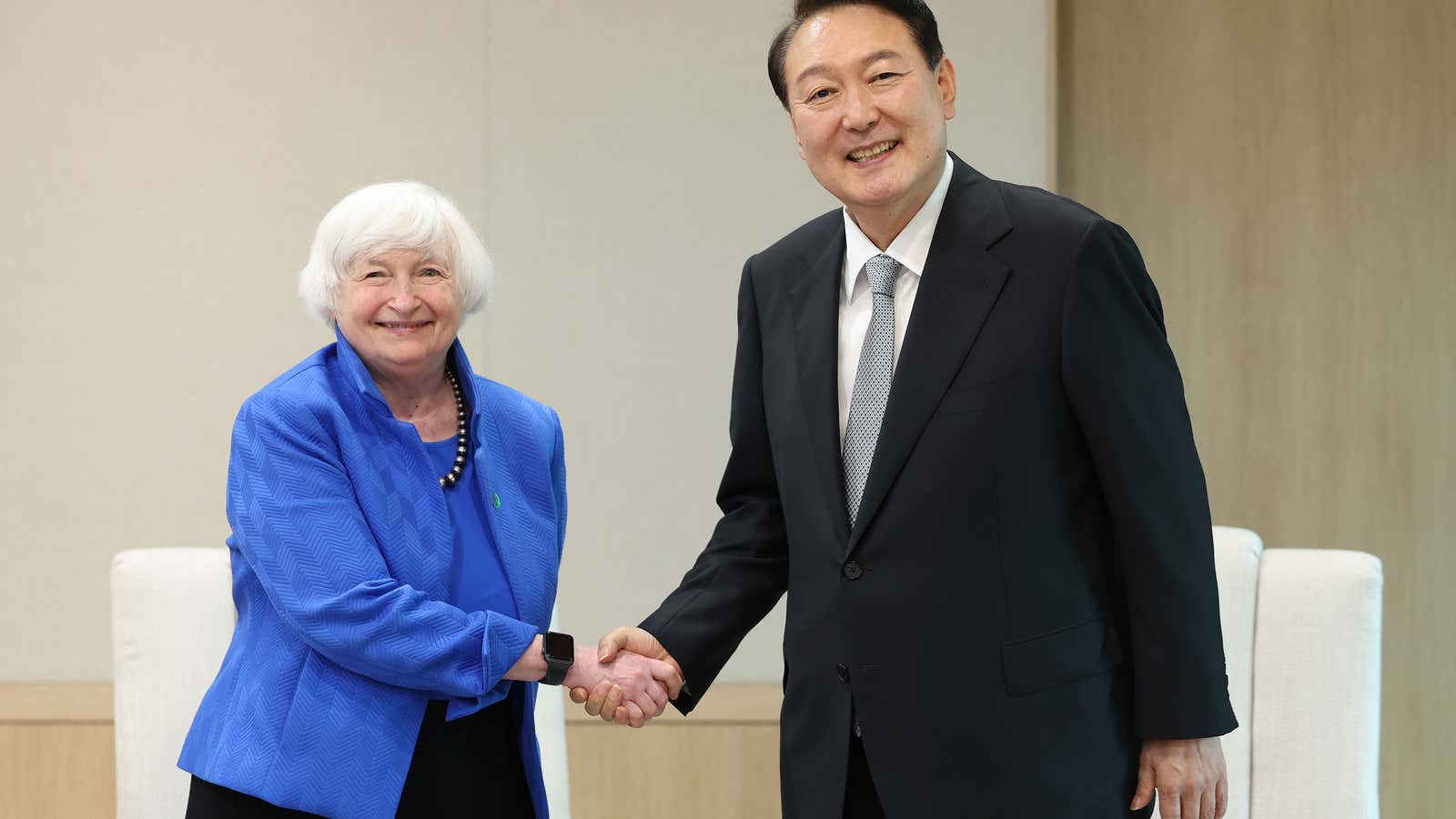Good morning, Quartz readers!
Here’s what you need to know
Janet Yellen called for closer trade ties between US allies. The treasury secretary advocated the practice of friendshoring to protect against supply chain disruptions.
Uber agreed to compensate overcharged disabled passengers. The mobility company will pay “several million dollars in compensation” to settle a lawsuit.
Amazon sued more than 10,000 Facebook group administrators. The e-commerce giant is fighting against fake product reviews.
The UK’s antitrust regulator is reviewing Meta’s purchase of Giphy. The tech giant was previously told it would have to undo its $315 million acquisition of the GIF database.
Protesters blocked a highway in Panama City. Union workers rejected a government deal that would have cut fuel prices to end the two week-long protests against the cost of living.
S&P 500 CEOs earned 324 times the median employees’ pay. The wage gap has widened since 2020, according to US labor union AFL-CIO’s latest report.
What to watch for
Russian president Vladimir Putin is meeting his Iranian and Turkish counterparts in Tehran today, his second foreign trip since the invasion of Ukraine. Aside from the war in Europe, discussion will cover the ongoing Syrian conflict. Also likely on the agenda: supply chain issues.
Turkey is one of the countries most vulnerable to the supply shortages resulting from the war in Ukraine. Located on the southern side of the Black Sea, Turkey relies on Russia and Ukraine for more than 80% of its wheat imports and is a key trade passage connecting Europe’s breadbasket to Africa and the Middle East.
Last week, Ankara announced it had reached a deal with Russia, Ukraine, and the UN to establish a safe corridor for grain shipments. Remaining issues in the deal will likely be smoothed out during the summit, and if finalized, could relieve pressure amid a global food crisis.
Europe isn’t ready for its heat wave
The record-breaking temperatures hitting Europe today couldn’t have come at a worse time. The continent has faced rising energy prices and insecurity since the invasion of Ukraine, with Russia’s shuttering of natural gas the latest incident in an ongoing crisis.

High energy prices can be life threatening, especially for those who can’t afford heating and cooling for their homes. Nearly 3,000 (pdf) people are killed by heat-related illness in Europe annually, a figure that officials project could increase 10-fold by 2050 as a result of climate change.
And Europe isn’t yet able to sustain itself on alternative energy alone. Coal prices are surging, and many nuclear plants are running below capacity or being closed. Countries are hastily building solar and wind, but have been hampered by rising equipment costs and supply chain delays. To meet the energy demands, the EU is turning to the Middle East for supply.
What’s fueling Sri Lanka’s economic crisis?
It’s not everyday that protesters break into the estate of a sitting president and take a swim in the pool. But it’s not everyday that a country such as Sri Lanka falls into an economic tailspin.
For all the focus on avoiding a recession in the US or Europe, a wide swath of emerging economies are also entering choppy waters. A combination of staggering debt, dwindling currency reserves, declining revenue, and rising prices have put Sri Lanka on a fast-track to collapse. But it’s not a unique recipe, writes Quartz editor-in-chief Zach Seward in the latest Weekend Brief, as there are signs of rough times ahead for Zambia and Lebanon, too.
✦ Get more insights into the global economy in the Weekend Brief. Quartz members get exclusive access. Become a member today and get 40% off when you sign up!
Quartz’s most popular
😛 Why Unicode is approving fewer and fewer new emoji
⚖️ The pros and cons of salary transparency
🚫 Mastercard may have disabled African virtual dollar cards due to fraud claims
🔥 There’s a problem with the way we talk about burnout
🥽 What the newest high-end AR devices will cost
🤑 What is the price of oil around the world?
Surprising discoveries
A man sued a company over a lifetime sock warranty… Bass Pro Shops may not actually offer “the last sock you’ll ever need to buy.”
…and the duct-taped banana artist is being sued for copyright infringement. The fruit suit alleges Maurizio Cattelan copied an earlier piece, Banana & Orange (2000).
Morti the robot taught itself to walk in one hour. The quadruped bot’s learning style is similar to that of baby animals.
A verbal insult is like a tiny slap in the face. And it turns out it doesn’t matter who the negative words are directed at.
Wrist sensors can detect covid before symptoms emerge. The tech could help curb the spread of the virus.
Our best wishes for a productive day. Send any news, comments, everlasting socks, and wall fruit to hi@qz.com. Reader support makes Quartz available to all—become a member. Today’s Daily Brief was brought to you by Sofia Lotto Persio, Julia Malleck, Tim McDonnell, and Morgan Haefner.
